大学英语语法和写作College English Grammar and Writing 12 Clause Adverbial clauses38页PPT
大学英语语法3——形容词资料讲解
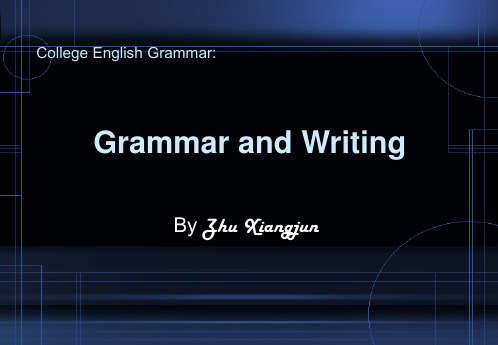
a popular singer → The singer is popular.
Some words can only be used as predictive adjectives. They have no degree of comparison and cannot be modified by degree adverbs such as too, very, much, almost, nearly, enough, hardly and so on.
• Generally, adjectives may be classified into two: one is attributive adjectives which are placed before nouns and the other is predictive adjectives which are placed after link verbs.
Most adjectives with initial letter a- are predictive
adjectives, such as afraid,alike,alive,alone, asleep,awake, ahead, ashamed etc.
And some others are ill, well, faint, glad, pleased, sorry, sure, certain, unable, ready, fond and so on.
Modifiers
A modifier is any word that acts to describe or qualify another word in such a way that it enriches the other words meaning. It usually may be an adjective, an adverb or a prepositional phrase. Adding modifiers can make sentences more explicit, more interesting and more powerful. Let’s look at an example.
大学英语作文关于英语语法令我头疼

大学英语作文关于英语语法令我头疼全文共3篇示例,供读者参考篇1College English Composition: English Grammar Makes My HeadacheLearning English grammar has always been a challenging part for many college students, including myself. It's not only because English grammar rules are intricate and complex, but also because there are so many exceptions that make it difficult to remember. This is why I often find myself scratching my head in frustration whenever I come across a grammar question in my assignments or exams.One of the biggest headaches for me is the proper use of tenses. English has twelve tenses, and each tense has its own rules and usage. Sometimes it's hard to determine which tense to use in a particular situation, especially when the context is not clear. This often leads to confusion and errors in my writing.Another grammar issue that I struggle with is the use of articles. In English, there are two types of articles: indefinite (a, an) and definite (the). Knowing when to use each type of article canbe a challenge, especially when dealing with countable and uncountable nouns. I often find myself unsure whether to use "a" or "an" before a word, which can affect the overall clarity of my writing.Subject-verb agreement is another aspect of English grammar that gives me headaches. It's essential to ensure that the subject and verb in a sentence agree in number and person. However, sometimes I find it hard to determine whether to use a singular or plural verb, especially when dealing with compound subjects or tricky sentence structures.Punctuation is another aspect of English grammar that often confuses me. Knowing when to use commas, semicolons, colons, and dashes can be challenging, and improper punctuation can change the meaning of a sentence entirely. This is why I always have to double-check my punctuation while writing to ensure clarity and correctness.Despite these challenges, I understand the importance of mastering English grammar. Good grammar skills not only help improve communication but also enhance writing fluency and coherence. Therefore, I try to overcome my grammar struggles by seeking help from my instructors, using grammar resources, and practicing regularly. I believe that with time and effort, I willbe able to conquer my difficulties with English grammar and become a better writer and communicator.篇2College English Essay: English Grammar Gives Me a HeadacheEnglish grammar is a fundamental aspect of the English language, and as a college student studying English, I have come to learn that mastering grammar is crucial for effective communication and writing. However, I must admit that English grammar often gives me a headache. The rules, exceptions, and nuances of English grammar can be overwhelming and confusing at times. In this essay, I will discuss some of the challenges I face with English grammar and share strategies that have helped me overcome them.One of the main challenges I encounter with English grammar is the sheer number of rules and exceptions to those rules. For example, the rules regarding subject-verb agreement, verb tenses, and pronoun usage can be difficult to remember and apply correctly. Additionally, English has many irregular verbs, plurals, and pronouns that do not follow standard patterns, making it even more confusing for non-native speakers like me.Another aspect of English grammar that I find challenging is understanding the nuances of the language. English has many subtle rules and conventions that native speakers intuitively understand but are not always explicitly taught in grammar books. For example, knowing when to use articles (a/an/the) or prepositions (in/on/at) can be tricky for non-native speakers, as the usage often depends on context and idiomatic expressions.Moreover, the syntax and sentence structure of English can be complex and varied, requiring a deep understanding of grammar rules to construct coherent and grammatically correct sentences. For example, the use of passive voice, relative clauses, and conditional sentences can be confusing for non-native speakers, as they involve specific word order and verb forms that must be used correctly.Despite the challenges I face with English grammar, I have found several strategies that have helped me improve my grammar skills. Firstly, I make a conscious effort to practice grammar regularly by reading books, articles, and essays written in English. This exposure to written English helps me internalize grammar rules and patterns, making them easier to remember and apply in my own writing.Secondly, I rely on grammar resources such as textbooks, online grammar guides, and grammar-checking tools to clarify any doubts or questions I have about specific grammar rules. These resources provide clear explanations, examples, and exercises that help me reinforce my understanding of English grammar.Additionally, I actively seek feedback from my professors, tutors, and peers on my writing, as they can point out any grammar errors or mistakes that I may have overlooked. By receiving constructive criticism and guidance, I can learn from my mistakes and improve my grammar skills over time.In conclusion, English grammar can be a challenging aspect of language learning, but with dedication, practice, and the right resources, it is possible to overcome these challenges and become proficient in English grammar. As a college student studying English, I continue to work on improving my grammar skills and expanding my knowledge of the language. While English grammar may give me a headache at times, I am determined to master it and become a confident and competent English speaker and writer.篇3College English Essay: English Grammar Gives Me a HeadacheEnglish grammar is one of the most challenging aspects of learning the language for many students, myself included. The rules and exceptions can be confusing and overwhelming, making it difficult to express oneself accurately and proficiently. In this essay, I will delve into the reasons why English grammar gives me a headache and the strategies I use to overcome these obstacles.To begin with, English grammar is notorious for its complex rules and exceptions. There are countless rules for verb tenses, sentence structure, punctuation, and more, all of which must be followed precisely to communicate effectively. Additionally, English is a language with many irregular verbs, pronouns, and spelling patterns, adding to the confusion and difficulty of mastering its grammar.Another reason why English grammar is so challenging is the lack of consistency in the language. Unlike some languages with straightforward rules and patterns, English grammar often defies logic and can be unpredictable. For example, irregular plurals, verb conjugations, and sentence constructions can vary wildly and make it challenging to memorize and apply consistently.Furthermore, English grammar can be intimidating due to the pressure of communicating accurately and effectively. As a student, I often feel self-conscious about making mistakes in my writing and speaking, knowing that grammar errors can detract from my message and credibility. This fear of judgment and criticism can create a mental block that impedes my ability to communicate confidently and fluently in English.Despite these challenges, I have found several strategies to help me navigate the complexities of English grammar more effectively. Firstly, I actively engage in grammar practice and exercises to reinforce my understanding of key concepts and rules. By practicing regularly, I can internalize the rules and patterns of English grammar, making it easier to apply them in my writing and speaking.Secondly, I seek feedback from professors, tutors, and peers to identify areas of improvement in my grammar skills. Constructive criticism and guidance from others allow me to pinpoint my weaknesses and address them proactively, leading to gradual improvement and development in my grammar proficiency.Lastly, I strive to approach English grammar with a positive and curious mindset, embracing mistakes as opportunities forgrowth and learning. By viewing grammar challenges as stepping stones rather than stumbling blocks, I can cultivate resilience and perseverance in my language learning journey.In conclusion, English grammar can be a formidable adversary for many students, presenting a myriad of rules, exceptions, and inconsistencies that can be overwhelming. However, with dedication, practice, and a positive attitude, it is possible to overcome these challenges and enhance one's proficiency in English grammar. By adopting effective strategies and seeking support from others, I have learned to navigate the intricacies of English grammar and improve my communication skills gradually. Ultimately, mastering English grammar is a rewarding and empowering achievement that opens doors to greater opportunities and success in both academic and professional settings.。
关于英语语法令我头疼的大学英语作文
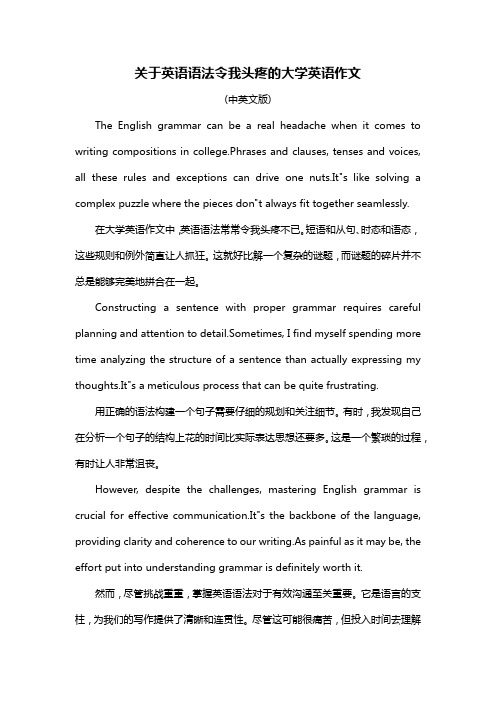
关于英语语法令我头疼的大学英语作文(中英文版)The English grammar can be a real headache when it comes to writing compositions in college.Phrases and clauses, tenses and voices, all these rules and exceptions can drive one nuts.It"s like solving a complex puzzle where the pieces don"t always fit together seamlessly.在大学英语作文中,英语语法常常令我头疼不已。
短语和从句、时态和语态,这些规则和例外简直让人抓狂。
这就好比解一个复杂的谜题,而谜题的碎片并不总是能够完美地拼合在一起。
Constructing a sentence with proper grammar requires careful planning and attention to detail.Sometimes, I find myself spending more time analyzing the structure of a sentence than actually expressing my thoughts.It"s a meticulous process that can be quite frustrating.用正确的语法构建一个句子需要仔细的规划和关注细节。
有时,我发现自己在分析一个句子的结构上花的时间比实际表达思想还要多。
这是一个繁琐的过程,有时让人非常沮丧。
However, despite the challenges, mastering English grammar is crucial for effective communication.It"s the backbone of the language, providing clarity and coherence to our writing.As painful as it may be, the effort put into understanding grammar is definitely worth it.然而,尽管挑战重重,掌握英语语法对于有效沟通至关重要。
大学英语语法6——连接词省名师优质课赛课获奖课件市赛课一等奖课件
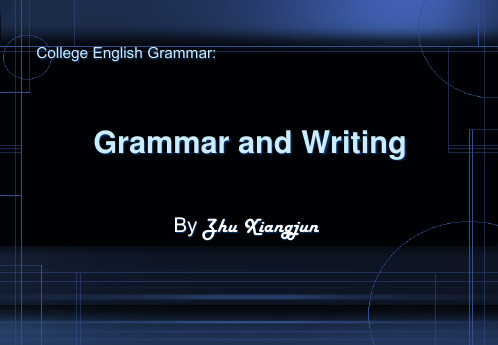
Grammar and Writing
By Zhu Xiangjun
Unit 6
Modifiers:Conjunctions
• Grammar: Conjunctions • Writing:
Correcting: Antecedent Problems Rewriting: How to combine into compound sentences
The possible meanings of conjunctive adverbs number six. 1. Time: afterwards, then, finally, eventually, later 2. Addition: also, furthermore, moreover, besides, in addition 3. Cause: as a result, accordingly, consequently, hence,
• Heavy rain would wash away the soil.
• Heavy rain would cause serious floods as well.
• Heavy rain would not only wash away the soil but also cause serious floods as well.
paint on one of the hands and slowed the clock down.
4. Conjunctive adverbs Conjunctive adverbs are used to clarify the relationship
大学英语语法1——主语谓语(1)教学文案
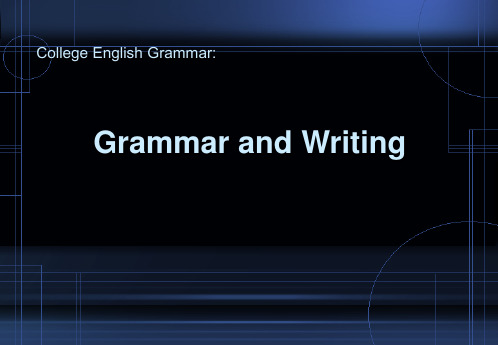
• Some of the buried workers are still alive.
• The babies grew nervous from the loud noise.
A verb is often made up of more than one word. The verb that expresses the action or state of being of the subject is called main verb. The word that accompany the main verb is called an auxiliary/ helping verb, which helps the main verb express mood or time by forming various tenses.
• In my garage, there is an old car. _______________. It is a Cadillac, a very classical luxury car, manufactured in 1966. The car has 65.000 original miles on it, but sitting in a damp garage for most of its life didn’t do many favors for it.
College English Grammar:
Grammar and Writing
Unit 1
Basic parts of a sentence (I)
• Grammar: 1. Subject and predicate 2.Hard-to-find subjects
大学英语语法和写作College English Grammar and Writing 2 Basic parts of a sentence 共20页
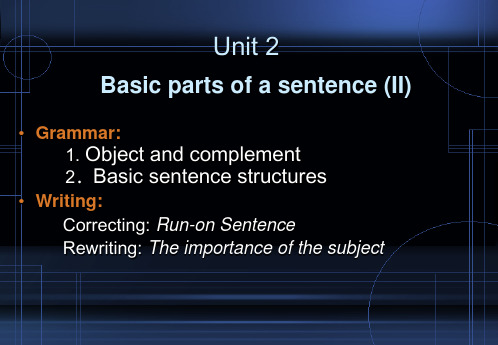
Exercises 1: Combine the sentences in each set into a single clear sentence. Omit words that are needlessly repeated, but don't leave out any important details. Keep in mind
• My favorite playwright is William Shakespeare. • Mark Twain became a pilot on a steamboat. • She felt uneasy in the crowd.
The complement of an action verb is called an object. Subject is the doer of the action, and the object is the receiver of the action.
Object and complement
Generally, verbs can be put into two: linking verbs and action verbs. Both of them require a word to complete their meaning. We can call such a word complement. The complement of a linking verb is called a predicative or a subject complement, which describes or renames the subject. For example:
关于英语语法的重要性的英语作文大学
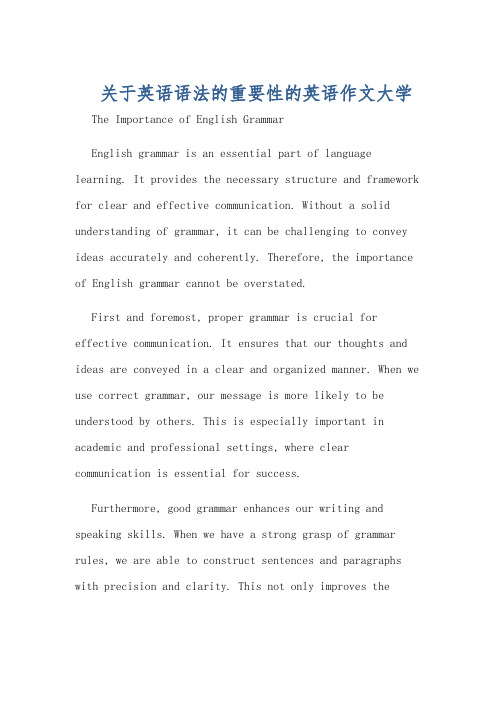
关于英语语法的重要性的英语作文大学The Importance of English GrammarEnglish grammar is an essential part of language learning. It provides the necessary structure and framework for clear and effective communication. Without a solid understanding of grammar, it can be challenging to convey ideas accurately and coherently. Therefore, the importance of English grammar cannot be overstated.First and foremost, proper grammar is crucial for effective communication. It ensures that our thoughts and ideas are conveyed in a clear and organized manner. When we use correct grammar, our message is more likely to be understood by others. This is especially important in academic and professional settings, where clear communication is essential for success.Furthermore, good grammar enhances our writing and speaking skills. When we have a strong grasp of grammar rules, we are able to construct sentences and paragraphs with precision and clarity. This not only improves thequality of our writing, but also makes us more effective communicators in verbal conversations.In addition, understanding English grammar is essential for language proficiency and fluency. A solid foundation in grammar allows us to express ourselves accurately and confidently. It enables us to use a wide range of vocabulary and sentence structures, making our language more dynamic and expressive.Moreover, knowledge of grammar is essential for academic and professional success. In educational settings, students are expected to write essays, reports, and research papers with proper grammar and punctuation. In the professional world, effective communication is key to success, and good grammar is a fundamental aspect of this.In conclusion, English grammar is of paramount importance for effective communication, language proficiency, and academic and professional success. It provides the necessary structure and framework for clear and coherent expression. Therefore, it is essential for language learners to prioritize the study and practice of grammar in their language learning journey.英语语法的重要性英语语法是语言学习的重要组成部分。
英语语法对我来说很头疼的大学英语作文

英语语法对我来说很头疼的大学英语作文English Grammar is Really Hard for MeHi, my name is Tommy and I'm in 5th grade. I have to write this essay for my college English class about how grammar is super difficult for me. I don't really know much about essays or college, but here goes!First of all, English just has way too many rules about grammar. Why can't everyone just speak however they want without all these made-up rules? In math class, 2+2 will always equal 4 no matter what. But in English, there are exceptions to every single rule which makes no sense to me.Like why do we have to put 's' at the end of words to make them plural, but then words like 'sheep' and 'deer' stay the same in both singular and plural form? Whose idea was that? And why do we say "go" but then the past tense is "went" instead of "goed"? Pointing out all the irregular verbs is going to take me a really long time.And let's not even get started on subjects and objects and when to use 'who' versus 'whom.' I can never remember which one is supposed to be used as the subject or object. I always mix them up. "Who opened the door?" or "The door was opened bywhom?" I have no idea! Just let me say "Who opened the door?" and "Who did the door get opened by?" and we'll all know what I'm talking about.Then there are these things called articles, like 'a,' 'an,' and 'the.' Why do we even need them? "I ate an apple" versus "I ate apple" means the same dang thing! And don't even get me started on the 24 different tenses in English. Past, present, future, present perfect, past perfect, future perfect, and a million other ones I can't keep straight. Why can't we just say what we want to say and be done with it?Spelling is another nightmare I have to deal with. Why is "night" spelled with a 'gh' but we don't pronounce the 'gh'? Totally makes no sense. And words like "ough" can be pronounced like 8 different ways: "though", "through", "thought", "plough", "hiccough", "dough", "enough". How is anyone supposed to keep track of that? English needs a total spelling makes-sense makeover.Grammar is also super boring. Reading grammar books makes my eyes glaze over. Why can't we just learn this stuff by watching fun movies or listening to cool music instead of staring at paperbacks full of terminology and rules I'll never use againafter this class? "Identify the antecedent to the pronoun in this perfectly bland sample sentence." No thanks!What also makes no sense are phrases like "You can't have your cake and eat it too." I for sure want to have my cake AND eat it. That's the whole point of cake! Or sayings like "Don't count your chickens before they hatch." Well duh, I'm counting the baby chicks, not the eggs! These stupid English idioms and expressions are so confusing and make no logical sense.Probably the worst part though is trying to learn proper English writing structure. You know, with topic sentences, body paragraphs, transition sentences, conclusions, and all that tedious formatting. Who even writes like that besides English teachers? I just want to freely ramble on about what's on my mind without having to organize it in any particular way. Grammar rules are chopping my creative thoughts into structured boxes and it's not fair!So in summary, English grammar is my nemesis. Too many endless rules, exceptions to rules, weird spellings, tenses, parts of speech, and other crazy stuff I have to try to memorize. Does anyone actually speak following all these rules in real life? I don't think so! People should just talk however they want and English teachers should stop torturing kids with all these grammarguidelines. That's what I think and you can't make me learn grammar if I don't want to! The end.。
College English Grammar 15
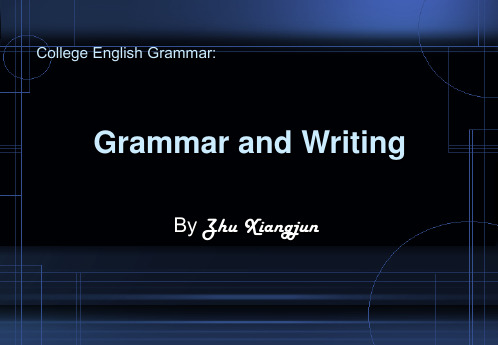
Notice: 1) Simple sentences can be very effective for drawing a reader's attention, but you have to use them with care: too many simple sentences can make your writing seem choppy and childish. 2) In a simple sentence, no commas separate compound elements.
• My brother has never been abroad before. • He is finding this trip very exciting. My brother has never been abroad before, so he is finding this trip very exciting. • The lights were high up on the cliffs. • She knew she was near the shore. The lights were high up on the cliffs; thus, she knew she was near the shore. • The plane was late. • Detectives were waiting at the airport all morning. The plane was late; detectives were waiting at the airport all morning.
1. Simple sentences The most basic type of sentence is a simple sentence. It can be as short as one word (when the subject “you” is understood): • Run! Usually, a simple sentence contains one independent/main clause. To be complete, it must have at least one subject and one predicate. Both the subject and the predicate may have modifiers such as adjectives, adverbs, prepositional phrases, participial phrases, etc. All of the following are simple sentences, because each contains only one clause: • Run! • The policeman runs. • The policeman runs fast. • The policeman on duty runs fast towards the car. • Receiving an emergent call from his men, the policeman on duty runs fast towards the waiting car.
大学英语语法与写作College English Grammar and Writing 15 Sentences_42
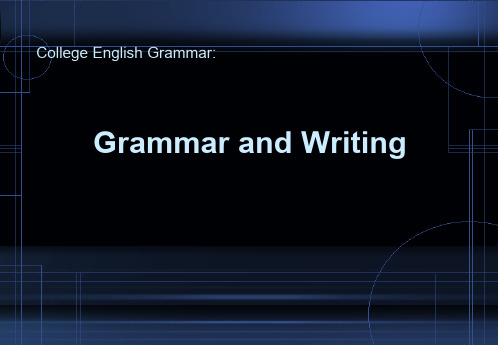
4. Compound- complex senteห้องสมุดไป่ตู้ces
A sentence that has two or more main clauses (MC) and at least one subordinate clause (SC) is called a compound-complex sentence. It is merely a combination of a compound sentence and a complex sentence.
1. Simple sentences
The most basic type of sentence is a simple sentence. It can be as short as one word (when the subject “you” is understood):
• Run!
country. We are all very excited and are looking forward to the
Olympic Games because they have never been held before in our country. • The fish has been sent to a museum. • In the museum, a scientist is examining it. • The fish is called an oarfish. The fish, which has been sent to a museum where it is being examined by a scientist, is called an oarfish.
大学英语语法——连接词

• The directors wanted to win recognition for their work.
• The directors wanted to receive recognition for their work.
• The directors wanted both to win and to receive recognition for their work.
OK?”
• I waited for your permission patiently, now it finally comes. • ✓I waited for your permission patiently and now it finally comes.
In addition, as coordinating conjunctions join two groups of words, they are essentially placed in the middle of a sentence, rarely as openers.
College English Grammar:
Grammar and Writing
By Zhu Xiangjun
Unห้องสมุดไป่ตู้t 6
Modifiers:Conjunctions
• Grammar: Conjunctions • Writing:
Correcting: Antecedent Problems Rewriting: How to combine into compound sentences
Conjunctions
Conjunctions are words that join single words or groups of words. They can be subdivided into coordinating conjunctions, correlative conjunctions and subordinating conjunctions. 1. Coordinating conjunctions
英语语法对我来说很头疼的大学英语作文
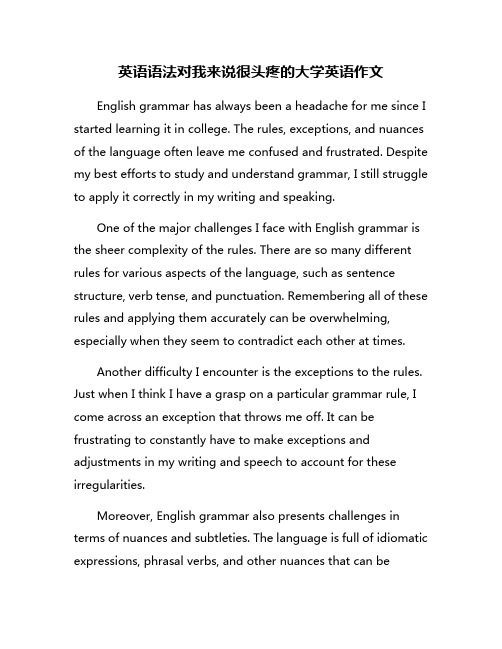
英语语法对我来说很头疼的大学英语作文English grammar has always been a headache for me since I started learning it in college. The rules, exceptions, and nuances of the language often leave me confused and frustrated. Despite my best efforts to study and understand grammar, I still struggle to apply it correctly in my writing and speaking.One of the major challenges I face with English grammar is the sheer complexity of the rules. There are so many different rules for various aspects of the language, such as sentence structure, verb tense, and punctuation. Remembering all of these rules and applying them accurately can be overwhelming, especially when they seem to contradict each other at times.Another difficulty I encounter is the exceptions to the rules. Just when I think I have a grasp on a particular grammar rule, I come across an exception that throws me off. It can be frustrating to constantly have to make exceptions and adjustments in my writing and speech to account for these irregularities.Moreover, English grammar also presents challenges in terms of nuances and subtleties. The language is full of idiomatic expressions, phrasal verbs, and other nuances that can bedifficult to grasp for non-native speakers like myself. Understanding and using these nuances correctly adds another layer of complexity to an already challenging subject.Despite these challenges, I continue to work on improving my English grammar skills through studying, practice, and feedback from teachers and peers. I know that developing a strong grasp of grammar is essential for effective communication in English, and I am determined to overcome my struggles in this area.In conclusion, English grammar is a formidable obstacle for me in my college English studies. The complexity of the rules, the prevalence of exceptions, and the nuances of the language all contribute to my difficulties in mastering grammar. However, I am committed to overcoming these challenges and becoming more proficient in English grammar through diligent effort and perseverance.。
College English Grammar 15
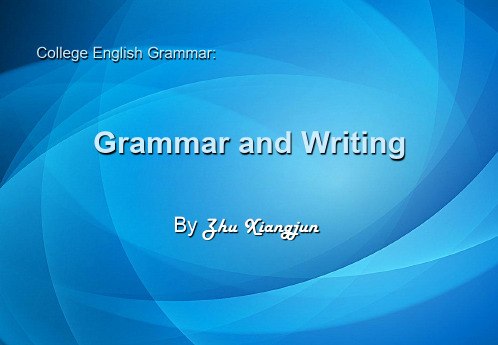
Usually, a simple sentence contains one independent/main clause. To be complete, it must have at least one subject and one predicate. Both the subject and the predicate may have modifiers such as adjectives, adverbs, prepositional phrases, participial phrases, etc. All of the following are simple sentences, because each contains only one clause:
Senteade up of a clause. A clause is a group of words that contains a subject and a predicate. Clauses can be put into two kinds: independent/main clauses and dependent/subordinate clauses. An independent/main clause consists of a subject and a predicate and can stand alone as a sentence. • the president took a seat • she plays an important role in the game
关于英语语法令我头疼的大学英语作文

关于英语语法令我头疼的大学英语作文全文共3篇示例,供读者参考篇1English Grammar, the Bane of My ExistenceAs a college student studying English, I have come to dread one particular subject: English grammar. While some may find it fascinating or even easy, I have always struggled with the intricate rules and exceptions that come with mastering the English language. In this essay, I will explore the reasons why English grammar gives me a headache, how I have tried to improve my skills, and why I continue to struggle despite my best efforts.One of the main reasons why English grammar is so challenging for me is the sheer complexity of the rules. Unlike some other languages that have a more straightforward set of grammar guidelines, English is full of exceptions, irregular verbs, and confusing punctuation rules. Just when I think I have finally figured out a particular rule, I come across a sentence that breaks all the rules and leaves me scratching my head in confusion.Another reason why English grammar is so difficult for me is that there are so many resources available online and in textbooks that offer conflicting advice. For example, one source may tell me that it is incorrect to end a sentence with a preposition, while another source may say that it is perfectly acceptable in modern English. This constant barrage of contradictory information only serves to confuse me further and leaves me unsure of what is truly correct.In an effort to improve my grammar skills, I have tried various strategies over the years. I have attended grammar workshops, taken online courses, and even hired a tutor to help me with my writing. While these efforts have certainly helped me to better understand certain aspects of English grammar, I still find myself struggling with the finer points and nuances of the language.Despite my best efforts, I continue to make mistakes in my writing and speaking that I know could easily be avoided if I had a better grasp of English grammar. I often find myselfsecond-guessing my sentences, spending hours combing through my work for errors, and feeling frustrated when I realize that I have made a simple grammatical mistake yet again.In conclusion, English grammar is a subject that continues to challenge and frustrate me as a college student. While I have made some progress in improving my skills, I know that I still have a long way to go before I can confidently say that I have mastered the intricacies of the English language. However, I am determined to continue working on my grammar skills and hope that one day I will be able to write and speak fluently without the fear of making a mistake. Until then, English grammar will continue to be the bane of my existence.篇2The Study of English Grammar has always been a headache for many college students in their English classes. As a fundamental aspect of language learning, English grammar is essential for understanding and producing language effectively. However, the complexity and inconsistency of English grammar rules often leave students confused and frustrated.One of the main challenges of English grammar is the vast number of rules that govern the usage of different parts of speech, verb tenses, sentence structures, and punctuation. For example, English verbs can be irregular, requiring students to memorize different forms for past tense and past participle. Additionally, English word order can be confusing, with differentrules for affirmative sentences, negative sentences, questions, and conditional sentences. These nuances can be difficult for students to grasp, leading to errors in their writing and speaking.Another obstacle in learning English grammar is the lack of consistency in rules and exceptions. English grammar rules are often arbitrary and can contradict each other, making it difficult for students to know when to apply certain rules. For example, English has many irregular verbs, such as "go-went-gone," that do not follow regular patterns of conjugation. In addition, English has many words with multiple meanings and uses, making it challenging for students to understand how to use them correctly in context.Furthermore, the rules of English grammar are constantly changing and evolving, adding to the confusion for students. New words and phrases are added to the English language regularly, and grammar rules can vary based on regional dialects and informal speech. This variability can make it challenging for students to keep up with the latest trends in English language usage.Despite these challenges, mastering English grammar is essential for students who wish to communicate effectively in both academic and professional settings. Proper grammar iscrucial for writing essays, reports, and research papers, as well as for participating in discussions, presentations, and debates. Employers also value employees who can communicate clearly and professionally, making English grammar skills a valuable asset in the workplace.To overcome the challenges of English grammar, students can employ a variety of strategies. One effective approach is to practice grammar exercises regularly, such as completing worksheets, quizzes, and online exercises. Students can also read extensively in English to expose themselves to different grammatical structures and styles of writing. Working with a tutor or language partner can provide additional support and feedback on grammar errors.In conclusion, while English grammar can be a source of frustration for many college students, it is also a crucial aspect of language learning that cannot be overlooked. By recognizing the challenges of English grammar and employing effective study strategies, students can improve their grammar skills and become more confident and proficient speakers and writers of English.篇3Title: The Headache of English Grammar in College EnglishIntroductionEnglish grammar has always been a challenge for many students, especially for those studying English as a second language. In college, the complexity of English grammar becomes even more apparent, leading to headaches for students trying to master the language. This essay will explore the difficulties of English grammar in college English and ways to overcome them.Difficulty in Understanding RulesOne of the main reasons why English grammar is so difficult in college is the vast number of rules and exceptions to those rules. From tenses to sentence structure, students must grapple with a multitude of grammar rules that seem to defy logic at times. For example, irregular verbs, phrasal verbs, and complex sentence constructions can confuse even the most diligent students. Moreover, the nuances of English grammar can be subtle and hard to grasp, making it challenging for students to apply the rules correctly in their writing and speaking.Difficulty in Retaining InformationAnother common issue students face with English grammar in college is the struggle to retain all the information they have learned. With so many rules to remember and exceptions to keep track of, it is easy for students to forget the finer points of grammar. This can lead to mistakes in their writing and speaking, which can be frustrating for both students and their teachers. Additionally, the fast pace of college courses can make it difficult for students to fully grasp and internalize the grammar concepts they are taught, adding to the challenge of mastering English grammar.Difficulty in Applying Grammar CorrectlyEven when students understand the rules of English grammar, applying them correctly in real-life situations can be a daunting task. English grammar is not a static set of rules but a living, evolving system that can vary depending on context, style, and audience. Students must navigate the complexities of formal and informal language, academic and creative writing, and spoken and written communication, all while adhering to the rules of grammar. This can be overwhelming for students, leading to errors and misunderstandings in their use of English grammar.Ways to Overcome the ChallengesDespite the difficulties of English grammar in college, there are strategies that students can use to overcome these challenges. One of the most effective ways to improve grammar skills is through practice. By regularly practicing grammar exercises, writing essays, and speaking in English, students can reinforce their understanding of grammar rules and develop fluency in using them. Additionally, seeking feedback from teachers, peers, or tutors can help students identify areas where they need improvement and receive guidance on how to correct their mistakes. Finally, using online resources, such as grammar websites, apps, and videos, can provide students with additional support and explanation of grammar concepts.ConclusionIn conclusion, English grammar in college can be a headache for many students, but with perseverance and practice, it is possible to overcome the challenges. By understanding the rules of grammar, retaining the information, and applying grammar correctly, students can improve their English skills and become more confident in their language abilities. With determination and hard work, mastering English grammar in college is achievable, and students can take pride in their progress and success in the language.。
大学英语语法和写作College English Grammar and Writing 15 Sentences 文档资料

country. ?We are all very excited and are looking forward to the
Olympic Games because they have never been held before in our country. ? The fish has been sent to a museum.
? In the museum, a scientist is examining it. ? The fish is called an oarfish. ? The fish , which has been sent to a museum where it is
SC +, +MC. or MC + SC. 2) Relative pronouns (for adjective clause)
Main + essential SC + Clause. or M +, + non-essential SC +, C. 3) Relative pronoun or adverbs (for noun clauses)
? She knew she was near the shore. ? The lights were high up on the cliffs ; thus, she knew
she was near the shore.
? The plane was late. ? Detectives were waiting at the airport all morning. ? The plane was late ; detectives were waiting at the
大学英语语法和写作College English Grammar and Writing 13 Subject clause and predictive clause 25页PP

• Had my operation been successful? • He asked his doctor that question. He asked his doctor if/whether his operation had been
• How much can you buy with so little money? [a wh-question]
• how much you can buy with so little money [a noun clause]
• Can you beat his score?
[a yes/no question]
College English Grammar:
Grammar and Writing
Unit 13
Subject clause and predictive clause
• Grammar: 1) Subject clause 2) Predictive clause
• Writing: Correcting: Faulty Coordination/Subordination Rewriting: How to expand a sentence
• We should build more power stations.
• The stations use water to produce power.
- 1、下载文档前请自行甄别文档内容的完整性,平台不提供额外的编辑、内容补充、找答案等附加服务。
- 2、"仅部分预览"的文档,不可在线预览部分如存在完整性等问题,可反馈申请退款(可完整预览的文档不适用该条件!)。
- 3、如文档侵犯您的权益,请联系客服反馈,我们会尽快为您处理(人工客服工作时间:9:00-18:30)。
1.2. To modify an adjective • The library is a good place. • There we study well. • It is quiet. The library is a good place to study because it is
quiet. [telling why]
1. Functions An adverbial clause is a subordinate clause that functions as an adverb to modify a verb, an adjective, or an adverb. It tells when, where, how, why, to what extent, or under what condition.
1.3. To modify an adverb • He was often disappointed. • He became hopeless. He was disappointed so often that he became
hopeless. [telling to what extent]
etc. Manner: as, as if, etc. Reason: as, because, for, in order that, since, so that,
that, etc. Degree: as, than, etc. Condition: in case, if, even if, provided, unless, etc. Concession: although, though, as, whereas, while, etc.
and asked to see a dress that was in the window.
When the adverbial clause finishes the sentence there is no need for a comma.
• He waited and waited. • The volcano became quiet. He waited and waited until the volcano became quiet.
3. Punctuation When an adverbial clause begins the sentence, a comma is used to separate it from the main clause.
• She hesitated for a moment. • She finally went in. • She asked to see a dress. • The dress was in the window. Though she hesitated for a moment, she finally went in
1.1. To modify a verb • She passed the driving test. • She obtained her driving license. After she had passed the driving test, she obtained her
driving license. [telling when]
Unit 12
Clause: Adverbial clauses
• Grammar: Adverbrticle Misuse Rewriting: Periodic/Loose sentences
Adverbial Clauses
• She goes to any place. • There are always crowds of people. • They are waiting to see her. Wherever she goes, there are always crowds of people
waiting to see her.
• He rang off. • I had no time to explain. He rang off before I could explain.
• He was exhausted. • He had been seemingly working for hours. He was exhausted as if he had been working for hours.
Here are kinds of adverbial clauses and some of their subordinating conjunctions.
Place: where, wherever Time: after, before, since, until, when, whenever, while,
2. Forms and kinds An adverbial clause always begins with subordinating conjunction (such as if, when, because, than, although) and includes a subject (S.) and a predicate (P.).
An adverbial clause = subordinating conjunction + S. + P.
Subordinating conjunctions that introduce adverbial clauses may indicate a relationship of time, place, manner, reason, condition or degree. They cannot be omitted. They cannot be subjects.
